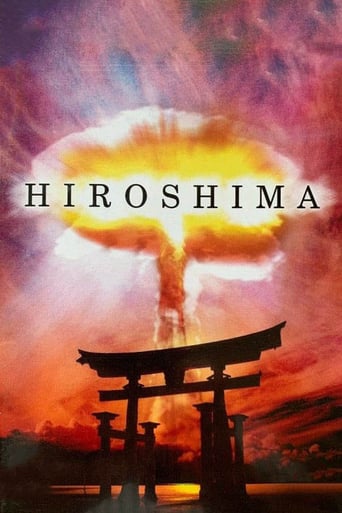Hitchcoc
We viewed this docudrama at a book study on the acceptability of the Truman's decision to bomb Japan. I was expecting to see a presentation of the awful realities of the bombing and appreciated that it really got into what went on behind closed doors, leading up to August 6, 1945. We are allowed into the private discussions with Truman, the Secretary of War, and the Secretary of State. Also, people like Robert Oppenheimer and Enrico Fermi make an appearance. There is a counter to these people as we watch Hirohito and the Japanese high command debate things like no surrender until the last Japanese citizen is dead. It is a little dry as these things must have been. For one thing, nobody knew exactly how much damage this bomb would do and whether it could even be delivered and armed. This is not preachy and I liked that. It showed nations under stress from the horrors of war, not knowing how many more of their loved ones would be lost. I spoke to several of my elderly friends and relatives who have continued to have no second thoughts about the decision to bomb Hiroshima and Nagasaki. They lived in a frightening world. Still, the horrible implications of nuclear weapons cause us to think. While this film would never win an Emmy for its acting, it gives us a view of the way things were and does in a pretty effective way.
emuir-1
I found this movie in my collection yesterday and realizing that I had never watched it and having no idea where it came from, I decided to view it.The depiction of the two sides, US and Japanese was impartial, both sides were dealing with similar issues, both sides had doves and hawks, although the Japanese were portrayed as quite good looking, tidy and well mannered, whereas the Americans were portrayed as cigar chomping, sloppy, loud-mouths swigging drinks as they advocated a 'kick ass' policy toward the 'Nips'. Easy to see this was not an American production. James F. Byrne in particular was shown to be a hawk in favor of showing the world that the US had the upper hand. Having spent a couple of billion on developing the bomb, the hawks wanted the taxpayer to see where their money had gone, every last dime. Equally, the Japanese military, having never lost a war, were against the very idea of unconditional surrender as they really did not understand what it mean. The politicians toyed with the dilemma of whether to sacrifice tens of thousands of people, and what the result might mean in the future, which I found rather strange given that 100,000 people died in one night in the saturation bombing of Tokyo, and that the Japanese had been responsible for millions of dead, not to mention the barbarity toward civilian internees in SE Asia. After Germany's surrender, the Americans were able to concentrate on very heavy bombing of Japan, which was on its last legs, but the military wanted to go out with a bang.My biggest complaint with the DVD was the lack of captions which meant that I could not follow the English. Fortunately, half the film was in Japanese which was subtitled, so I could understand their point of view. The color was such that I kept wondering what was wrong with my TV set as it was coming and going, until I read later that it was in a mix of black and white newsreel footage, tinted black and white for the drama, and normal color for the interviews with survivors. I would rate the actual film higher than 6, but for the lack of captions and the awful color, which in my opinion was pretentious.
Phil Karn
This is an outstanding production. And I think it no coincidence that it wasn't produced in the US.Over 50 years later, American emotions still run high about our use of nuclear weapons against Japan; the recent backlash against the Smithsonian exhibit is proof. This film is a nuanced, balanced, objective treatment with, as far as I can tell, remarkable historical accuracy. One sees just how simplistic and myopic the leaders of both sides were as they made (or avoided making) momentous decisions that affected the entire future of the human race. The one voice of reason, scientist Leo Szilard, is brushed off with hardly a hearing.This film is an effective indictment of our human propensity to place enormous powers in the hands of just a few individuals. I doubt any American producer could have made it.The film deftly mixes historical footage with re-enacted scenes using actors. Normally this sort of thing is rather jarring, but here it works. Even the transitions between the real Truman in newsreel footage and the actor playing him work well.
kaijuguy
Hiroshima is a great film, originally made for cable, about events leading up to the A-bomb being dropped on Japan. It shows the Japanese perspective very well and is one of the better WW2 films of recent years. Surprisingly, it is mostly a Canadian production that is very accurate with the facts they put on screen. Very well done.



